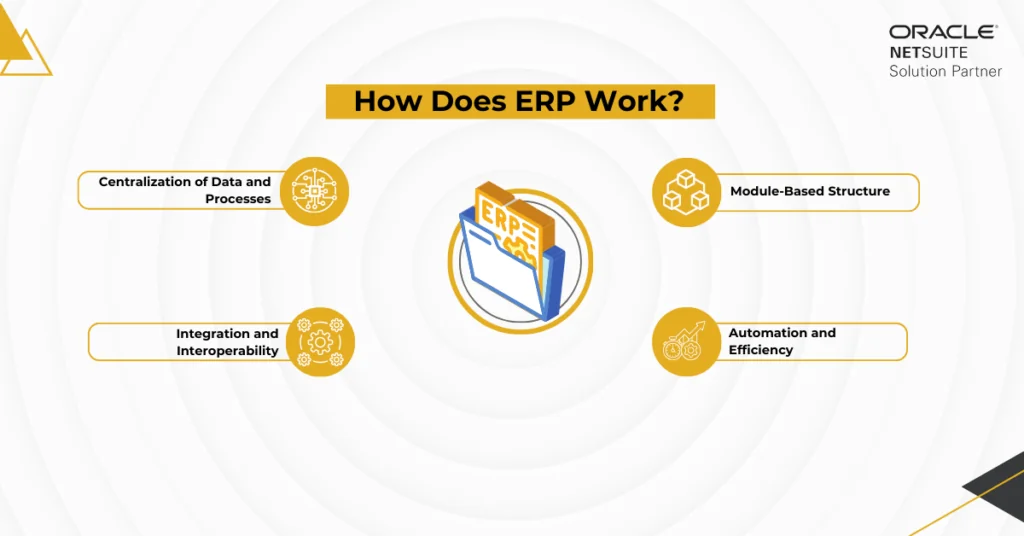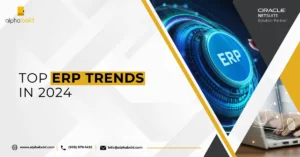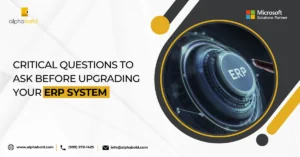Introduction
In the fast-paced world of business, efficiency is essential to stay competitive. An Enterprise Resource Planning (ERP) system is one way to improve efficiency. An ERP system can integrate various business functions, such as finance, inventory, sales, and customer relationship management, into a single system. This integration saves time and money and provides real-time data insights for informed decision-making.
In this article, we will discuss some of the key ERP features that can help businesses streamline their operations and improve efficiency.
What is ERP and How Does it Work?
ERP, or Enterprise Resource Planning, is a sophisticated software solution that plays a pivotal role in modern businesses. But what is ERP and how does it work? Let’s explore this powerful system in detail.

How Does ERP Work?
- Centralization of Data and Processes: At its core, ERP serves as a centralized hub for various business functions and their associated data. What is ERP and how does it work in terms of centralization? It consolidates information from different departments, including finance, human resources, inventory management, procurement, and more, into a unified platform. This centralization ensures that all stakeholders have access to accurate and up-to-date data.
- Module-Based Structure: ERP systems are typically organized into modules, with each module addressing a specific business area. For example, there are finance modules for managing accounting and financial transactions, HR modules for personnel management, and supply chain modules for handling inventory and procurement. What is ERP and how does it work with these modules? These modules are interconnected, allowing for seamless data sharing and collaboration among different departments.
- Integration and Interoperability: An essential aspect of ERP is its capability to integrate seamlessly with various systems and applications used within the organization. This integration ensures that data flows smoothly between ERP modules and external software, enhancing operational efficiency. What is ERP and how does it work to achieve this integration? It relies on standardized data formats and interfaces to facilitate communication between systems.
- Automation and Efficiency: ERP systems are known for their ability to automate repetitive tasks and processes. For instance, they can automate data entry, generate reports, and even trigger workflows based on predefined rules. This automation reduces manual labor, minimizes errors, and boosts productivity. What is ERP and how does it work to enhance efficiency? It streamlines operations, allowing employees to focus on more strategic and value-added activities.
In summary, ERP, or Enterprise Resource Planning, is a comprehensive software solution that centralizes data and processes across an organization through a module-based structure, integration capabilities, and automation. What is ERP and how does it work? It empowers businesses to optimize operations, improve decision-making, and gain a competitive edge in today’s dynamic business environment.
Read more about NetSuite Project Management with Power BI Integration Impact
Optimize your Business Operations with NetSuite
Ready to leverage NetSuite ERP features for business success? Partner with us for tailored NetSuite solutions. Maximize your ERP capabilities today!
Request a DemoKey ERP Features for Modern-day Businesses
With ERP features playing such a pivotal role, businesses are better equipped to navigate the complexities of today’s market.
1. Process Automation:
An integral feature of an ERP system is automation, as it can eliminate repetitive business tasks, such as payroll, order processing, invoicing, reporting, and more. This automation reduces the time and effort required for manual data entry, minimizes errors, and allows employees to focus on tasks that add more value to the organization.
The inherent nature of an ERP system enables users to be connected with users in different departments across the organization. For instance, an inventory tracking module could trigger an automated shipment and invoice when a particular SKU becomes available, resulting in increased revenue and enhanced customer experience. Alternatively, line-of-business executives could receive real-time reports on cash flow and other key metrics to make informed decisions.
Read more about Benefits of GenAI Integration in Enterprise ERP Systems
2. System Centralization:
Data silos within an organization often lead to inefficiencies, missed opportunities, and misaligned efforts between departments. The most notable and significant advantage of features of ERP software is creating a central view of essential financial, operational, and business data that can be shared across the organization in near-real-time.
Companies can develop business intelligence through ERP systems by leveraging data to create insightful reports and identify actionable insights. This information can be used to optimize resource allocation, capitalize on new market opportunities, and inform strategic decision-making.
3. Efficient Data Utilization:
Efficient data utilization is an ongoing concern for CFOs and business leaders, as highlighted by Brainyard’s Winter 2020 survey. ERP functionalities, specifically the ability to gather, process and analyze large amounts of data, enable employees to collect diverse information and convert it into actionable insights. Data utilization is one of the core ERP functionalities sought out by businesses. It allows them to identify new business opportunities, optimize operations, minimize costs, detect fraud, and enhance customer service. The ability to analyze data effectively has become an essential component of strategic decision-making for organizations across various industries. Organizations can improve operational efficiencies, drive growth, and gain a competitive edge in the market by utilizing the ERP platform’s data-optimizing features.

ERP Selection Checklist
Master ERP selection with our comprehensive checklist. Ensure a successful implementation and maximize ROI.
Download Guide
4. Manufacturing and Supply Chain Management:
Multiple embedded features of an ERP system enhance manufacturing efficiency, including product planning, raw material sourcing, production monitoring, and business forecasting. These systems include various modules for assembly management, bill of materials, work order management, shop-floor control, distribution planning, and product tracking. When integrated with supply chain management (SCM), these ERP features can automate inventory planning and forecasting decisions, resulting in better coordination across different departments and improved accuracy in planning and execution. The end-to-end view of the production process provided by ERP features also results in increased efficiency, reduced costs, and improved quality control. With real-time visibility into manufacturing operations, companies can make informed decisions and take corrective actions as necessary. ERP features enable businesses to optimize their manufacturing processes and leverage data insights to improve performance, capitalize on new opportunities, and stay ahead of the competition.
5. Enhanced Reporting:
Enhanced reporting is one of the critical features of an ERP system, which is as crucial to business executives as effective data utilization. An ERP software’s reporting modules or features compile essential information about various business operations into insightful reports that aid stakeholders in making informed decisions, streamlining business processes, and identifying potential problem areas before they cause damage to the organization. The information generated may include intuitive visual representations, such as charts, graphs, and dashboards, which help discover trends and patterns that can improve business outcomes.
6. Financial Management:
Financial management is a multifaceted task that involves coordinating, organizing, and optimizing the allocation of funds for a business. Financial leaders need to be able to access and analyze financial data from all departments to make informed decisions about critical matters such as funding sources, cash management, and financial controls. The robust features of an ERP system can assist finance teams with the management process by enabling them to track, analyze, and report critical business data. ERP systems’ comprehensive financial management features are especially beneficial for large, complex organizations seeking to optimize their financial operations. By utilizing the financial features of ERP software, businesses can improve their decision-making processes and increase their overall financial efficiency.
Transform your Business with NetSuite ERP Solution!
Want to achieve growth with NetSuite ERP? AlphaBOLD guides you with NetSuite services. Reach out today and revolutionize your business operations with NetSuite ERP!
Request a Demo7. Streamlined HR Capabilities:
An ERP system’s HR module is a comprehensive employee management solution covering various workforce management aspects. The HR-oriented ERP features streamline complex HR functions like tax and benefits deductions, from payroll and onboarding to compensation management and timekeeping. This automation of routine HR tasks saves valuable time and reduces errors while contributing to cost savings for the organization.
Read more about 11 Benefits of Using HR Software for more insights.
AlphaBOLD is a top NetSuite Consulting company. Our senior NetSuite consultants have extensive experience in multiple verticals and can guide customers through complex transitions to your new ERP. We believe in a long-term client relationship; by understanding and building on the organization’s needs. We want to support customers in various areas, help them through operational challenges, and partake in their successes. We want to grow with our customers as their trusted NetSuite solution provider!
Conclusion
ERP systems provide organizations with many features and benefits that can significantly improve their efficiency and productivity. From streamlining business operations to delivering real-time insights and data analysis, robust ERP features can help organizations make better-informed decisions and optimize their resources for optimal results. With the ever-increasing complexity of modern business operations, ERP systems are becoming increasingly essential to stay competitive and meet the evolving demands of the market. ERP functionalities are an indispensable tool for organizations looking to succeed and thrive in the long run.









